Related Research Articles

Rhodesia, officially from 1970 the Republic of Rhodesia, was an unrecognised state in Southern Africa from 1965 to 1979. During this fourteen-year period, Rhodesia served as the de facto successor state to the British colony of Southern Rhodesia, and in 1980 it became modern day Zimbabwe.

Southern Rhodesia was a landlocked, self-governing British Crown colony in Southern Africa, established in 1923 and consisting of British South Africa Company (BSAC) territories lying south of the Zambezi River. The region was informally known as South Zambesia until annexation by Britain, at the behest of Cecil Rhodes's British South Africa Company. The bounding territories were Bechuanaland (Botswana), Northern Rhodesia (Zambia), Portuguese Mozambique (Mozambique) and the Transvaal Republic.

The national flag of Zimbabwe consists of seven even horizontal stripes of green, gold, red and black with a white triangle containing a red five-pointed star with a Zimbabwe Bird. The present design was adopted on 18 April 1980.

The Selous Scouts was a special forces unit of the Rhodesian Army that operated during the Rhodesian Bush War from 1973 until the reconstitution of the country as Zimbabwe in 1980. It was mainly responsible for infiltrating the black majority population of Rhodesia and collecting intelligence on insurgents so that they could be attacked by regular elements of the security forces. The unit did this by forming small teams that posed as insurgents and usually included captured insurgents. Over time, the Selous Scouts increasingly attacked insurgents themselves and operated in the countries that neighbored Rhodesia.

The Rhodesian Front (RF) was a conservative political party in Southern Rhodesia, subsequently known as Rhodesia. Formed in March 1962 by white Rhodesians opposed to decolonisation and majority rule, it won that December's general election and subsequently spearheaded the country's Unilateral Declaration of Independence (UDI) from the Federation of Rhodesia and Nyasaland in 1965, remaining the ruling party and upholding white minority rule through the majority of the Bush War until 1979. Initially led by Winston Field, the party was led through most of its lifetime by co-founder Ian Smith. Following the end of the Bush War and the country's reconstitution as Zimbabwe, it changed its name to the Republican Front in 1981.

The Rhodesian Bush War, also known as the Second Chimurenga, was a civil/anti communist conflict from July 1964 to December 1979 in the unrecognised country of Rhodesia.

The Scout Association of Zimbabwe is a member of the World Organization of the Scout Movement. Scouting in Zimbabwe shares history with Malaŵi and Zambia, with which it was linked for decades.

The Rhodesian Air Force (RhAF) was an air force based in Salisbury which represented several entities under various names between 1935 and 1980: originally serving the British self-governing colony of Southern Rhodesia, it was the air arm of the Federation of Rhodesia and Nyasaland between 1953 and 31 December 1963; of Southern Rhodesia once again from 1 January 1964; and of the unrecognised nation of Rhodesia following its Unilateral Declaration of Independence from Britain on 11 November 1965.
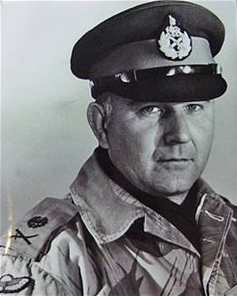
Lieutenant General George Peter Walls was a Rhodesian soldier. He served as the Head of the Armed Forces of Rhodesia during the Rhodesian Bush War from 1977 until his exile from the country in 1980.

Luc Panissod was Secretary General of the World Organization of the Scout Movement (WOSM). He previously held the role of Deputy Secretary General of WOSM and was made acting WOSM Secretary General in mid-November 2007 in replacement of Eduardo Missoni, following an institutional crisis over leadership and finance. In March 2009 he was officially appointed to the position of Secretary General of WOSM. Panissod laid down his post on 31 December 2011.
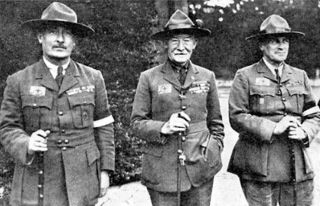
Colonel Granville Walton, OBE, CMG (1888-1974) served as The Boy Scouts Association Headquarters Commissioner for Overseas Scouts and, later, was Assistant Chief Scout to the Association's Chief Scout, Robert Baden-Powell, 1st Baron Baden-Powell.
John Neysmith(1942) of Canada was one of 12 elected volunteer members of the World Scout Committee, the main executive body of the World Organization of the Scout Movement, and the former International Commissioner for Scouts Canada. Through his involvement with the World Bureau, he has had the opportunity to travel and observe Scouts Canada's Brotherhood Fund contributions at work. Under his direction, the Scouts Canada Brotherhood Fund raised money to buy a cow for a Street Scout group in Nairobi, and bought and installed computer systems for training Scouters in ten Southern African countries. In his capacities, he has travelled to Indonesia and Uganda, where he has worked with Extension Scouts.

Kō Yoshida served as a member of the World Scout Committee, the International Commissioner of the Boy Scouts of Nippon, and as a member of the board of the World Scout Foundation.
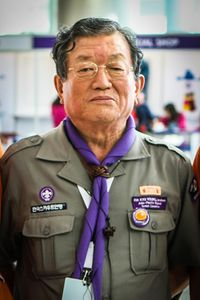
Kim Kyu-young served as the Director of the Korea Scout Association from 1982 to 1991 and Regional Director of the Asia-Pacific Region of the World Scout Bureau from 1990 to 2002.
Charles A. Martin served as the Chief Scout of the Boy Scouts of South Africa and also International Commissioner of the Scout Association of Rhodesia, which has since become the Scout Association of Zimbabwe.
Shree Ram Lamichhanne from Lalitpur, Nepal, served as the Chief Commissioner of Nepal Scouts and as the Regional Vice-Chairman of the Asia-Pacific Regional Scout Committee of the World Organization of the Scout Movement (WOSM), and as an elected volunteer member from 2009 to 2015, presently serving as Chairman of the Awards Committee.
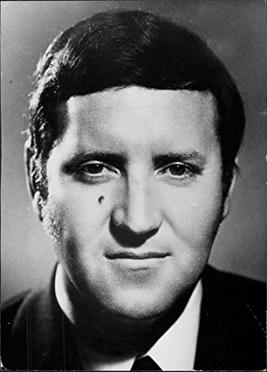
Rowan Cronjé was a Rhodesian politician who served in the cabinet under prime ministers Ian Smith and Abel Muzorewa, and was later a Zimbabwean MP. He emigrated to South Africa in 1985 and served in the government of Bophuthatswana.
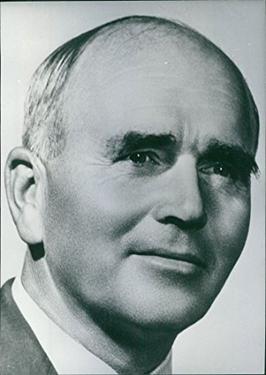
Lancelot Bales Smith, was an English-born Rhodesian farmer and politician. Elected to Parliament in the 1950s, he was a founding member of the Rhodesian Front in 1962. He was minister without portfolio in the cabinet of Prime Minister Ian Smith at the time of Rhodesia's Unilateral Declaration of Independence in 1965. In 1968, after serving as Deputy Minister of Agriculture, he was appointed Minister of Internal Affairs, a position he held until 1974, when he exited politics.

Combined Operations was a high level body established in 1977 to lead the efforts of the Rhodesian Security Forces during the Rhodesian Bush War. It was commanded by Lieutenant General Peter Walls. Prime Minister Ian Smith did not delegate formal authority to set overall policies or direct the actions of the security forces to Walls. The Combined Operations Headquarters also lacked the planning and intelligence staff needed to effectively carry out its functions. As a result, COMOPS mainly operated as an coordination body. Walls personally directed many attacks against Rhodesia's neighbours and other aspects of the war, at times independently of political control. Combined Operations was replaced by the Joint High Command following Rhodesia's transition to Zimbabwe in 1980.
References
- ↑ https://www.washingtonpost.com/archive/politics/1982/03/10/white-defects-in-zimbabwe/474d1109-b7b8-4255-a9b3-c2595200ee58/
- ↑ https://www.upi.com/Archives/1985/07/15/Crackdown-on-white-farmers-in-Zimbabwe/8928490248000/
- ↑ "List of recipients of the Bronze Wolf Award". scout.org. WOSM. Archived from the original on 29 November 2020. Retrieved 1 May 2019.